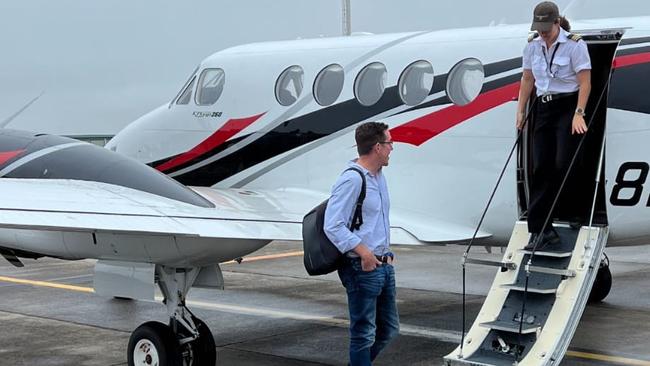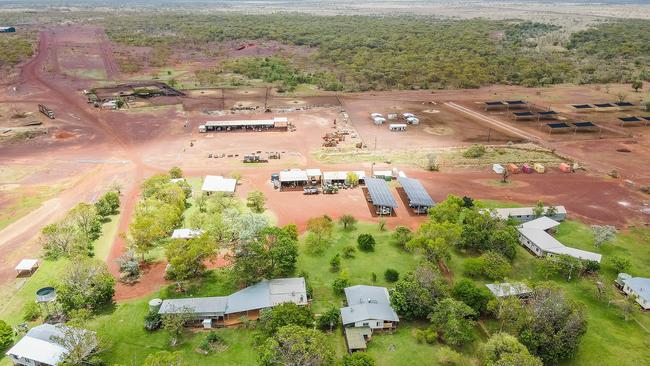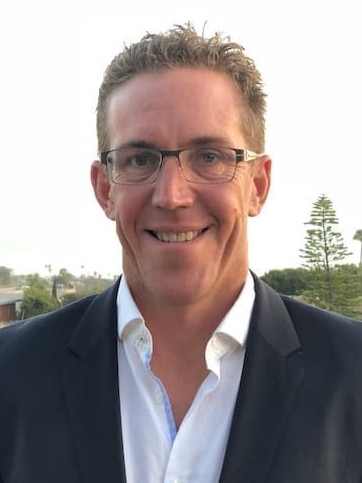Collapsed rural empire’s legacy of cattle, carbon, debt and broken promises
The cattle country empire of Sam Mitchell has been taken over by receivers, leaving in its wake debts, unfulfilled promises and plenty of questions. Here we unravel the WealthCheck demise.

Across the outback phones have started ringing about two men who promised to turn cattle country into carbon capture powerhouses, and employ station hands, fencers, helicopter pilots, truckers and more.
Instead they were left with broken promises, unpaid staff and bucketloads of bad debt.
The man at the centre of this is aspirational rural baron Sam Mitchell, who was schooled at Scots College in Sydney’s wealthy enclave of Bellevue Hill and who until recently resided at a luxury beachfront apartment in Bondi.
At his side has been Danny Thomas, the best-known rural real estate agent in the country, who left CBRE in 2020 and started his own firm, LAWD, notching up nearly $1bn in sales in his first year.
Mr Mitchell’s main companies, WealthCheck Management and The Edge, were placed in the hands of receivers after a private credit firm, owed $18m, and the Australian Taxation Office, owed more than $4m, called in debts.
The Australian is not suggesting either men have done anything wrong, but only that their companies have failed.
“When Sam first came we got the impression he was a reputable, honourable person. A mover and a shaker that was going to set the world on fire …” says one Northern Territory businessman who does not want to be named because he still contracts for LAWD.
“The whole carbon thing we take seriously because we are heavily involved in working with Indigenous groups in Arnhem Land. It’s a massive business for us.
“We thought because he’s had this money up his sleeve that it will flow through the community and be a positive, but it was anything but that.”
The businessman said he has been paid by Mr Mitchell, because he can be a “bit short” with people late paying their bills, but feels disappointed for “the small community that The Territory is”.
“It’s been pretty disappointing. It flows down the line quite quickly when people don’t get paid or they are slow to pay. That flows through the whole community, whether it’s fuel trucks or cattle trucks, or general supplies. Sam’s having an impact.”

Carbon Neutral chief executive Philip Ireland said his firm had been “contracted to provide services to entities that Mr Mitchell was associated with and we are yet to be paid in full”.
In just a few years since starting WealthCheck, 47-year old Mr Mitchell had notched up seemingly incredible land deals, including the announced purchase of retail billionaire Brett Blundy’s Northern Territory cattle properties for a record price of $250m. That deal fell over. With the benefit of hindsight it should have been a sign of what was to come.
Mr Mitchell and Mr Thomas set out in business together with a string of companies under the Mitchell River Cattle Company banner, snapping up sites across the top end and proposing carbon projects.
In 2022 WealthCheck announced the purchase of the Maryfield and Limbunya stations in the Northern Territory for $38.2m and $65.2m from Colin Ross’s North Star Pastoral, and last year purchased Conway Station for $14.5m and Benmara Station for $40m.
All up it accounted for more than 1.2 million hectares of cattle land.

In addition, Mr Mitchell’s Wonga group of companies, which hold a chunk of his empire of NT cattle stations, are subsidiaries of his The Edge business and are now embroiled in the collapse of the agribusiness.
These famous farms are exposed to the fortunes of the broader Mitchell would-be empire.
Accounting experts say that if the stations themselves are profitable they can continue to trade. However the administrators of The Edge may be able to force their sales and will call in any inter-company loans.
At this point it’s worth asking just who is Sam Mitchell and how on earth did he come to own, at least on paper, vast tracts of Australia’s landscape worth hundreds of millions of dollars?
Information about him is sketchy at best because so many of his former staffers will only speak on background, are unsure how much of what he told them about his past is true, and fear his alleged threats of litigation.
It is clear he was connected to the Harvard Endowment Fund, which had agricultural assets in Australia for several years. Harvard is yet to respond to questions about what his role was at the fund. But he was listed as a director on at least one agricultural company Harvard owned until 2020 when the asset was sold for about $120m through Mr Thomas – who was at CBRE at the time.
Mr Mitchell did not respond to recent requests for an interview and earlier this week told The Australian he would not comment.
Mr Thomas also did not respond to requests for an interview and a LAWD spokeswoman, Stacey Wordsworth said the real estate firm would also not comment about Mr Thomas’s alleged nondisclosure about working on both sides of some transactions.



